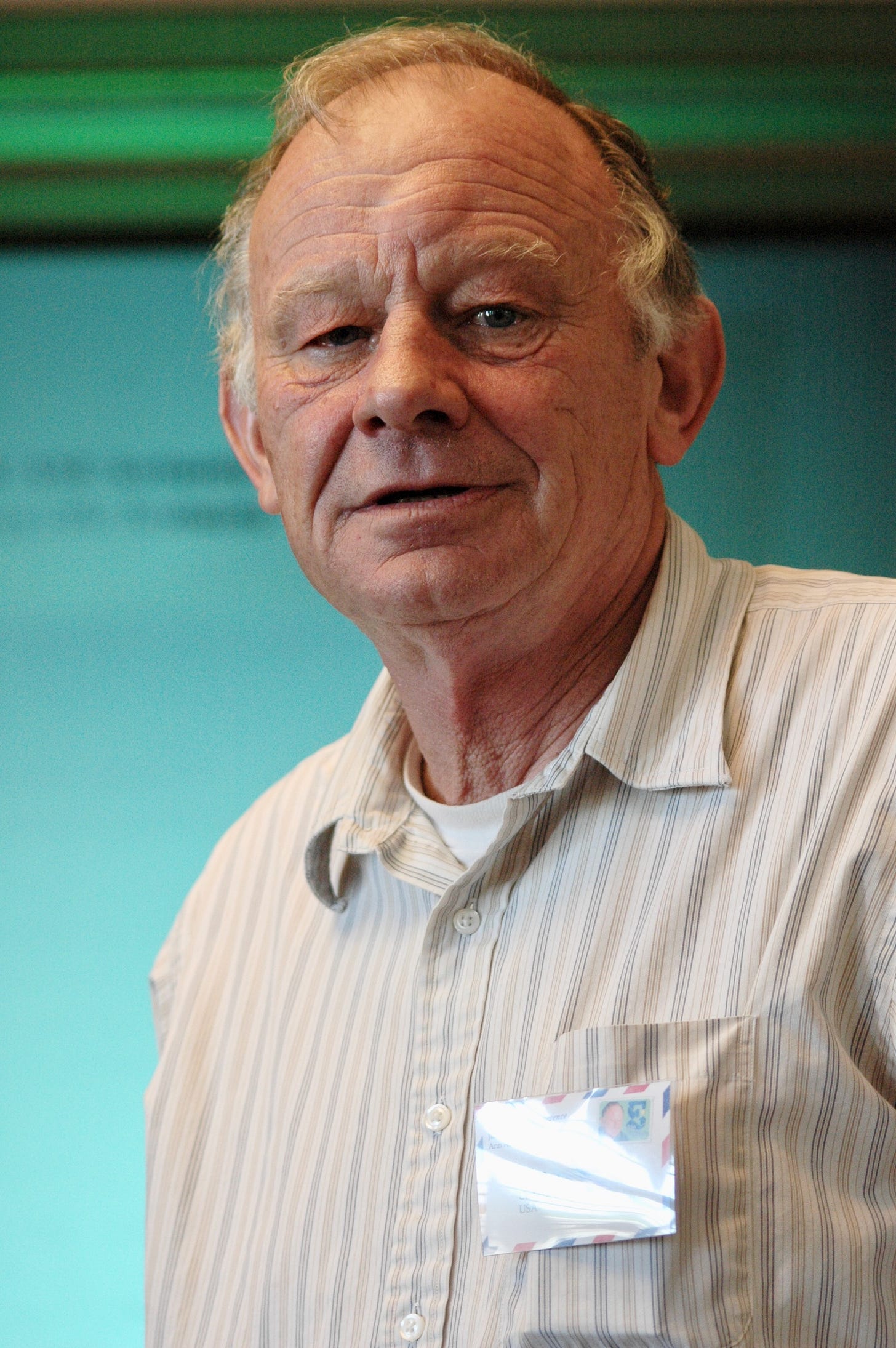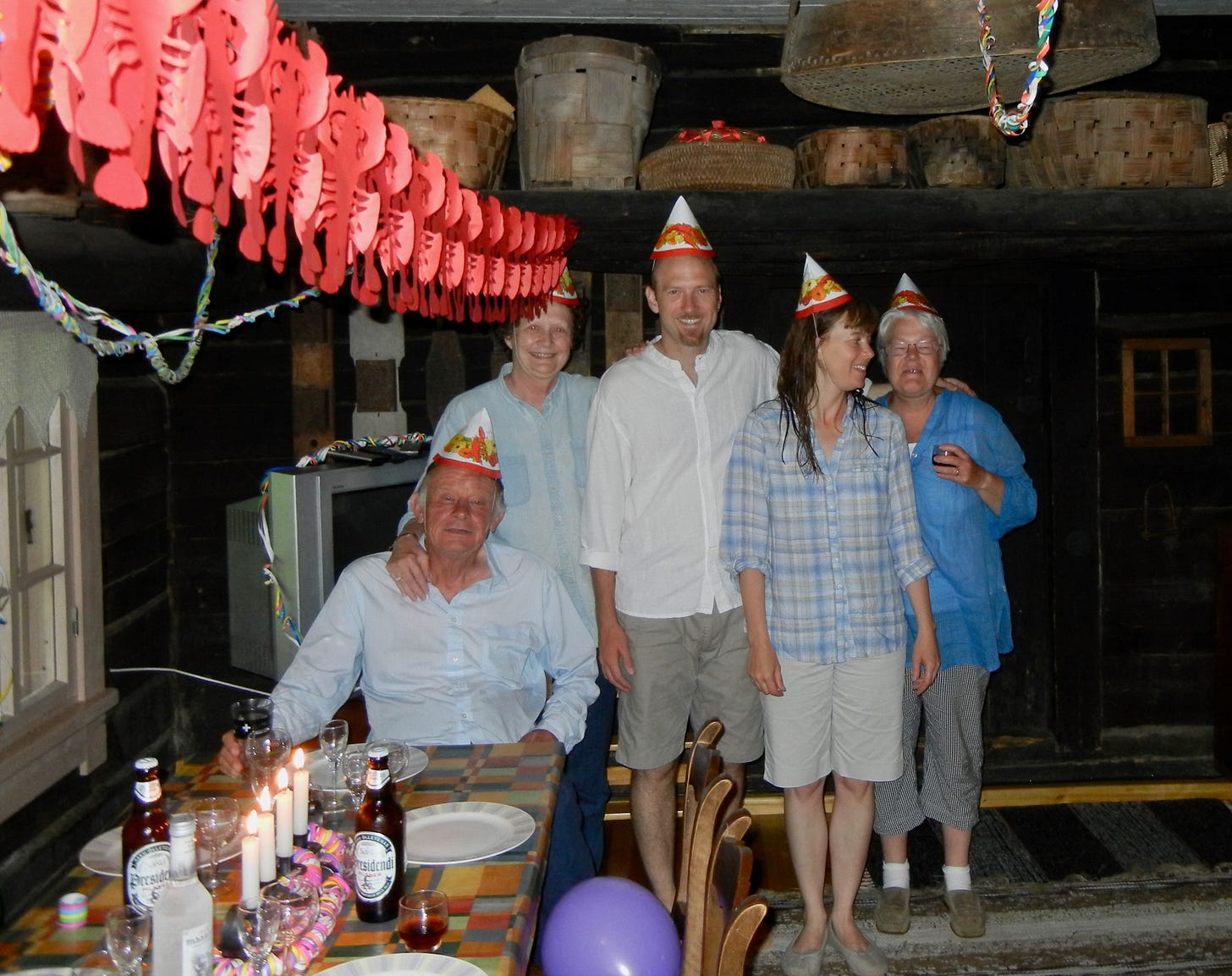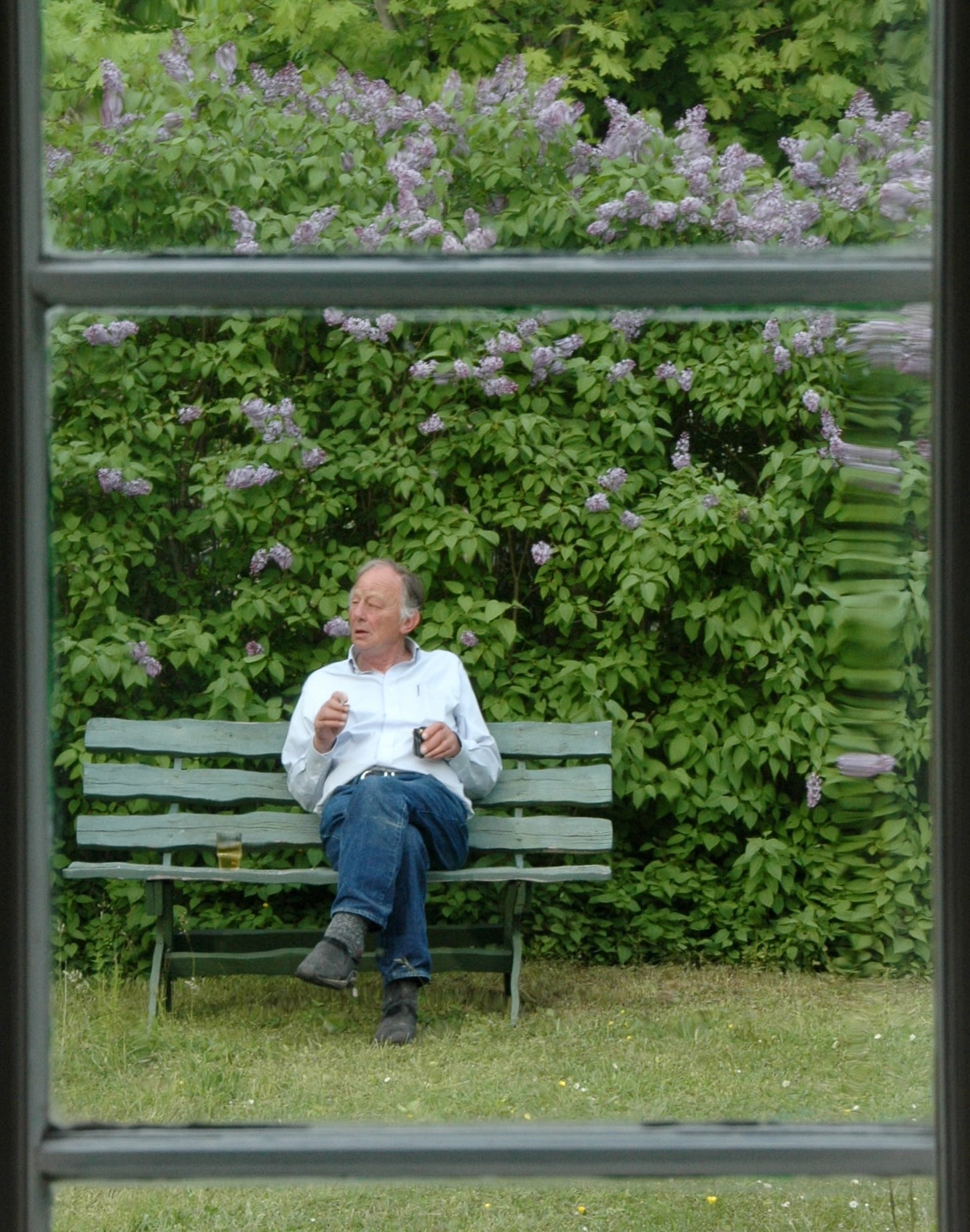The Double Loss of My Not-Quite-Father
Saying goodbye to a part of my life for the second time
Every language has weak spots in its vocabulary. While some words are crisply specific in their meaning (e.g., “decaffeinated”), others are mushy and ambiguous. The English word “old” falls into the latter category: It can mean either “not new” or “not young”. Thus, the expression “my oldest friend” is ambiguous. The Romance languages do not suffer from this problem. In Spanish, for example, there is a clear difference between mi amigo más antiguo and mi amigo más viejo.1
The past few months have been a season of loss in my life. Among other blows, I have lost both my oldest friend and my oldest friend—both mi amigo más antiguo and mi amigo más viejo.
In November I wrote about the death of my childhood friend Larry. Today I have a story to tell that is also sad, but in a different way. Last week saw the passing of my friend John, who was not quite a father to me, but rather something unique, something that both leaves and had already left a hole in my life—for I have now lost him twice.
I have decided not to use John’s surname, despite the fact that he was quite famous—or in truth, because of this fact. I prefer that people performing internet searches on his name not find this text, as it is not really about him, it is about my own grief. I don’t want to encumber his public legacy with my highly personal story.
John was a central element in my life during the decade I was married. It was at a conference in Tuscany that I attended with Annelie, my bride-to-be, that I met him; we were all academics and all in the same field, though she and I were very junior and he was very senior. I remember the first time I talked to him. We sat down at breakfast with John and his wife, Vi. We started discussing the conference, but the topic quickly turned to birdwatching, something that was an interest of mine and a passion of John’s. As you may recall, I argued in my essay “Talking to Strangers Can Change Everything” that some encounters with strangers can change your life, and this was one of those encounters.
Two years later, at John’s invitation, Annelie and I—now married—moved out to the Midwest to spend two years at his university. John was British but had a tenured position in the US that had softened him in funny ways. He still spoke with a posh Oxbridge accent, but he now did so wearing blue jeans.
We moved into a house only two blocks down the street from John and Vi. They were our neighbors, our colleagues, our friends, and our partners in adventure. The most frequent adventure was Sunday morning birding outings: John would pick us up at seven, and we would spend two hours driving around the countryside—surveying farmland, peering over marshes, and tramping through woods—until we were finally allowed to have breakfast. Our reward for the early outing was going to Stiver’s, a classic American country restaurant, where we would eat mounds of eggs, bacon, and pancakes, washed down with steaming coffee to bring our body temperature back to normal.
That was on the weekend. During the week, we were academics. John was a natural mentor. He was the sort of scholar who would be flown to Taiwan, and people there would line up to have their picture taken with him. But he was infallibly modest, and indeed, informal. I remember one formal dinner in Spain at which John was the guest of honor, to which he showed up wearing dungarees and a sweater. I also remember that event for two other reasons: First, because dinner was served so late that we didn’t start eating until after midnight (Spain!). And second, because the speech that our colleague Santiago gave about John moved me to tears.
John had a dedicated following of people he had mentored. When he retired, a conference was arranged in his honor at which only his academic “children” presented. It was a beautiful event, and the love that everyone felt for John was palpable.
John was one of the few academics I have encountered who allowed love to win out over ego. He was humble, he was kind, and he was generous. I think that his generosity is probably his most noteworthy trait. In fact, the only explicit piece of advice I remember John ever giving me was, “Be generous with your stuff. It doesn’t pay to be ungenerous.” Ever since, I have done my best to be generous—as a scholar, as a teacher, and as a person.
What was my relationship with John like? I grew up without a father and have always yearned to find anyone who could fill a parental role in my life. But John was more avuncular than paternal; he was simply a friend. He was wise, but age meant nothing to him, so the fact that I was thirty years his junior was irrelevant. He was a role model without the complications of family ties.
John had a playful sense of humor and liked to tease me. I think he could see that as an academic adolescent, I was still clinging white-knuckled to ego and pushing down love like an inappropriate erection. He never said anything directly, but simply modeled humility, kindness, and generosity until even I started to understand.
We took trips together, the four of us, sometimes with another couple as well. We would go to beautiful places where the birding was good, like the island of Gotland in Sweden. I remember one evening on Gotland when John and Philip and I had had a bit too much to drink and suddenly got it into our heads that damn it, we were going to see a corncrake (not a cornflake, as my computer doggedly insists I must mean). A corncrake is a bird that is very shy but calls frequently at night. So the three of us piled into the car and drove around between farms in the dark for an hour, stopping to sit with the engine off and the windows open to the Baltic summer night, waiting for the damn corncrake to call. If I remember right, it never did.
Electrical short, or corncrake? You decide. Audio: Wikimedia Commons
The last trip we ever took with John and Vi was to Saaremaa, an island in Estonia. I don’t remember the birding being particularly good, but I do have three memories from that golden summer holiday in a house with a thatched roof.
The first memory is that the airline lost John’s suitcase, so he had to wear my underpants and socks the whole time. This is a bond I had never had with a senior academic before.
The second memory is that it was August and two of the six of us were Swedish, so we had a kräftskiva—which is a party featuring boiled crayfish, silly hats, and much liquor—after which we tried a pie that Philip had made. Unfortunately, he had confused the sugar and the salt, so the pie turned out to be… rather savory.
The third memory is of going to the opera, of all things. You see, there was an opera festival underway on Saaremaa, and so we all dressed up as best we could (it was also fascinating to see how Estonians dress to go to the opera) and attended Mozart’s Die Entführung aus dem Serail in the ruins of a castle. The castle thing seemed like a lovely idea, except that there was no roof, just a tarpaulin, and it turned out that the local population of swifts got extremely excited about the event and flew around and around the whole time, shrieking their little lungs out. Mozart had not anticipated this.
The first time I lost John was when Annelie and I divorced. It was not an ugly separation, as divorces go, but sides were taken. As often happens when a couple separates, be it explicitly or implicitly, we divvied up our friends the way we divvied up our furniture: “OK, you take the couch, the dining room table, the chairs, Mike and Sue, and Bobbi.” I felt, at the time, that she needed John and Vi more than I did, so I let her have them. I have missed them ever since.
That was over ten years ago. At first, the pain of losing John melted into the maelstrom of pain that was the aftermath of the divorce, so the pang was indistinct. But as those waters gradually subsided, I started to notice that there was a John-shaped hole in my life.
I am not sure whether it was the last time I ever saw him, but I remember saying goodbye to John in Heathrow airport once. I think perhaps I was on my way to London and he was continuing back to the US. I remember looking at him and wanting to shout, “Do you realize how much I love you?! Do you understand how important you are to me?!”
But John was, after all, British, and these things are simply not said. So we looked each other in the eye, smiled, and hugged. In his laconic way, he simply said, “Bye.”
That was over a decade ago. And now I have lost him again. Today I find myself pouring molten bronze into that John-shaped hole in my life, knowing that there can be no more repair, there can only be remembrance. I will place this statue of my friend, my mentor, my not-quite-father, in the quiet palace of my memory, beside the other memorials to things that have made me who I am.
How I miss his twinkling humor and his cheerful grumbling! I would give anything for one more breakfast at Stivers, one more argument about the checklist and whether it counts if only John heard the whip-poor-will.
But all that ended long ago. Now, all I can do is honor his memory by trying to reflect his kindness and generosity onto others. The mirror and the light, indeed. Thank you, John. For being a beacon for so many, for being so much to me.
Yes, it’s true that you can also make this distinction through the placement of viejo: mi más viejo amigo vs. mi amigo más viejo.















I am so sorry. I am sharing your grief today because of a different loss, that touches a little on your own: the loss and continuing destruction of all this is/was good, high, beautiful, rich, in American history and culture. Your John seems a truly fitting symbol of this.
(Aside: i have always wanted to go to Gotland, I love Estonia (Tallinn) and have dreamed of returning since 2007…) Be well, even in your grief.
Beautifully written, absolutely conveying your loss. That's rare.
Memories are not enough but they are also such a gift. I've been thinking the last few days of one of my extra dads, wishing I'd just moved in with him, taken care of him at the end, knowing he would not have allowed that. He was not British but an old Southerner We did not always agree, but we had some good arguments, and I learned some about rough grace. It's been over twenty years since my friend died but he's still strong in me, and I'm grateful. We are fortunate to have these holes.